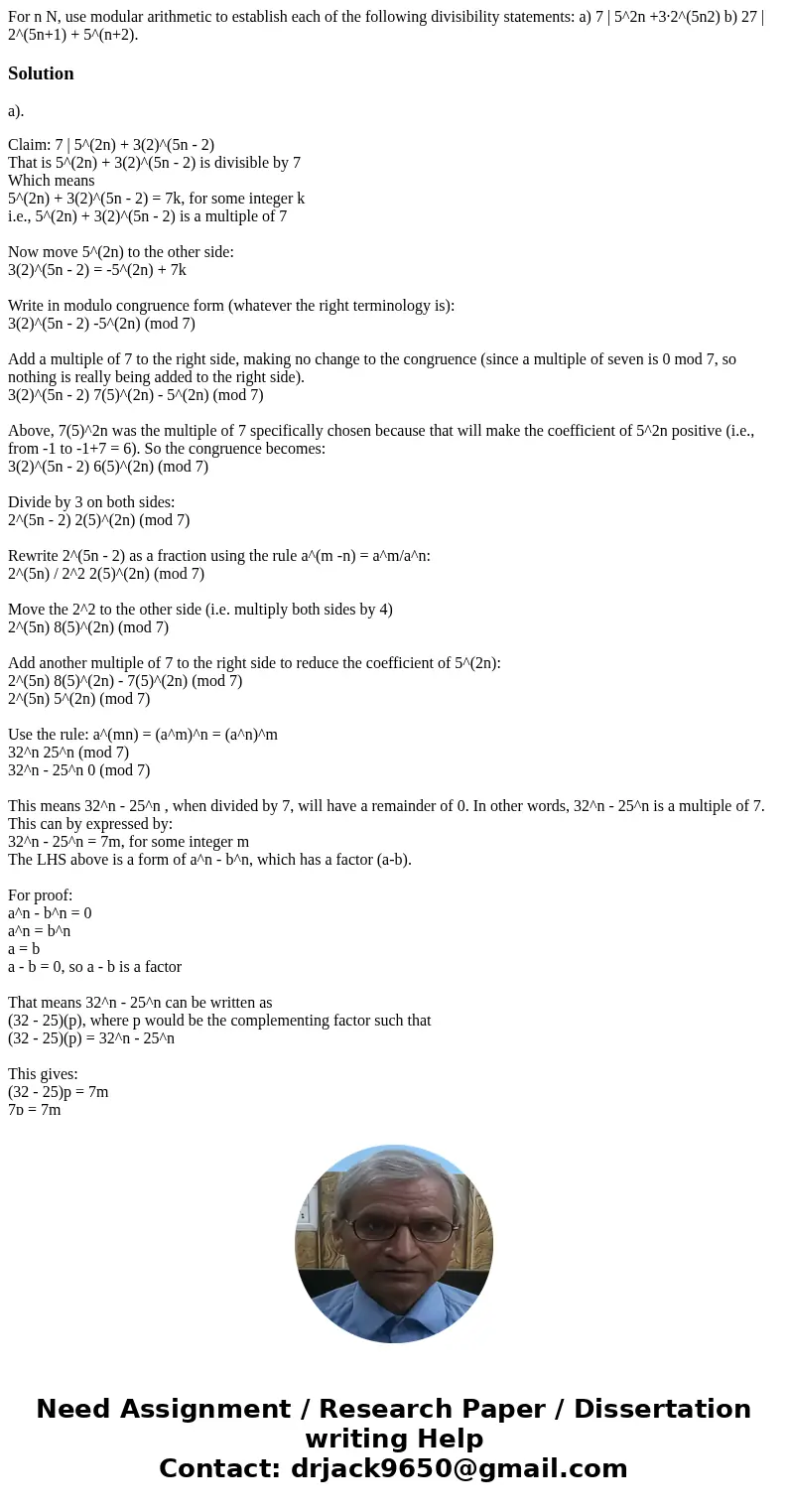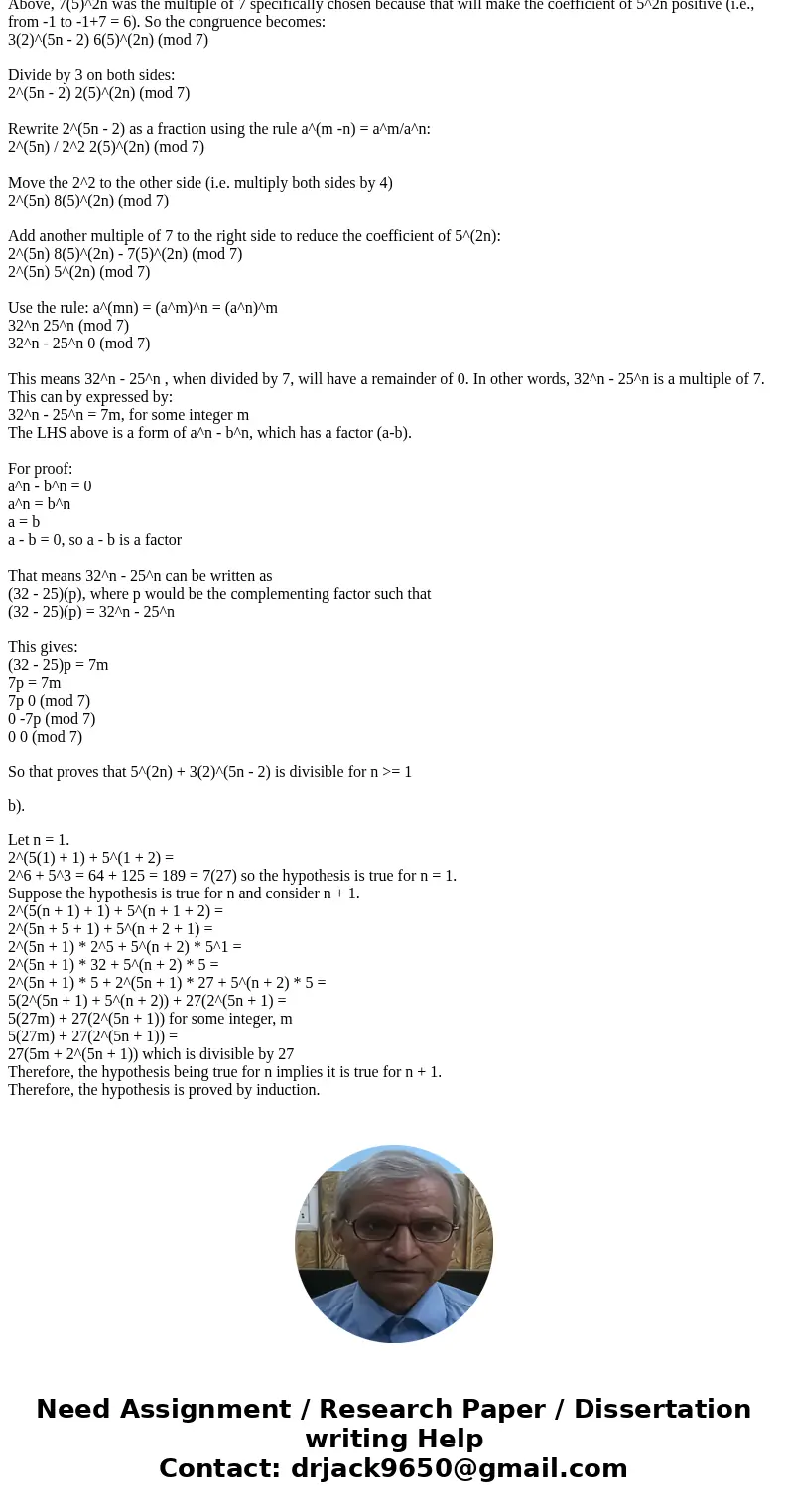For n N use modular arithmetic to establish each of the foll
For n N, use modular arithmetic to establish each of the following divisibility statements: a) 7 | 5^2n +3·2^(5n2) b) 27 | 2^(5n+1) + 5^(n+2).
Solution
a).
Claim: 7 | 5^(2n) + 3(2)^(5n - 2)
That is 5^(2n) + 3(2)^(5n - 2) is divisible by 7
Which means
5^(2n) + 3(2)^(5n - 2) = 7k, for some integer k
i.e., 5^(2n) + 3(2)^(5n - 2) is a multiple of 7
Now move 5^(2n) to the other side:
3(2)^(5n - 2) = -5^(2n) + 7k
Write in modulo congruence form (whatever the right terminology is):
3(2)^(5n - 2) -5^(2n) (mod 7)
Add a multiple of 7 to the right side, making no change to the congruence (since a multiple of seven is 0 mod 7, so nothing is really being added to the right side).
3(2)^(5n - 2) 7(5)^(2n) - 5^(2n) (mod 7)
Above, 7(5)^2n was the multiple of 7 specifically chosen because that will make the coefficient of 5^2n positive (i.e., from -1 to -1+7 = 6). So the congruence becomes:
3(2)^(5n - 2) 6(5)^(2n) (mod 7)
Divide by 3 on both sides:
2^(5n - 2) 2(5)^(2n) (mod 7)
Rewrite 2^(5n - 2) as a fraction using the rule a^(m -n) = a^m/a^n:
2^(5n) / 2^2 2(5)^(2n) (mod 7)
Move the 2^2 to the other side (i.e. multiply both sides by 4)
2^(5n) 8(5)^(2n) (mod 7)
Add another multiple of 7 to the right side to reduce the coefficient of 5^(2n):
2^(5n) 8(5)^(2n) - 7(5)^(2n) (mod 7)
2^(5n) 5^(2n) (mod 7)
Use the rule: a^(mn) = (a^m)^n = (a^n)^m
32^n 25^n (mod 7)
32^n - 25^n 0 (mod 7)
This means 32^n - 25^n , when divided by 7, will have a remainder of 0. In other words, 32^n - 25^n is a multiple of 7. This can by expressed by:
32^n - 25^n = 7m, for some integer m
The LHS above is a form of a^n - b^n, which has a factor (a-b).
For proof:
a^n - b^n = 0
a^n = b^n
a = b
a - b = 0, so a - b is a factor
That means 32^n - 25^n can be written as
(32 - 25)(p), where p would be the complementing factor such that
(32 - 25)(p) = 32^n - 25^n
This gives:
(32 - 25)p = 7m
7p = 7m
7p 0 (mod 7)
0 -7p (mod 7)
0 0 (mod 7)
So that proves that 5^(2n) + 3(2)^(5n - 2) is divisible for n >= 1
b).
Let n = 1.
2^(5(1) + 1) + 5^(1 + 2) =
2^6 + 5^3 = 64 + 125 = 189 = 7(27) so the hypothesis is true for n = 1.
Suppose the hypothesis is true for n and consider n + 1.
2^(5(n + 1) + 1) + 5^(n + 1 + 2) =
2^(5n + 5 + 1) + 5^(n + 2 + 1) =
2^(5n + 1) * 2^5 + 5^(n + 2) * 5^1 =
2^(5n + 1) * 32 + 5^(n + 2) * 5 =
2^(5n + 1) * 5 + 2^(5n + 1) * 27 + 5^(n + 2) * 5 =
5(2^(5n + 1) + 5^(n + 2)) + 27(2^(5n + 1) =
5(27m) + 27(2^(5n + 1)) for some integer, m
5(27m) + 27(2^(5n + 1)) =
27(5m + 2^(5n + 1)) which is divisible by 27
Therefore, the hypothesis being true for n implies it is true for n + 1.
Therefore, the hypothesis is proved by induction.


 Homework Sourse
Homework Sourse